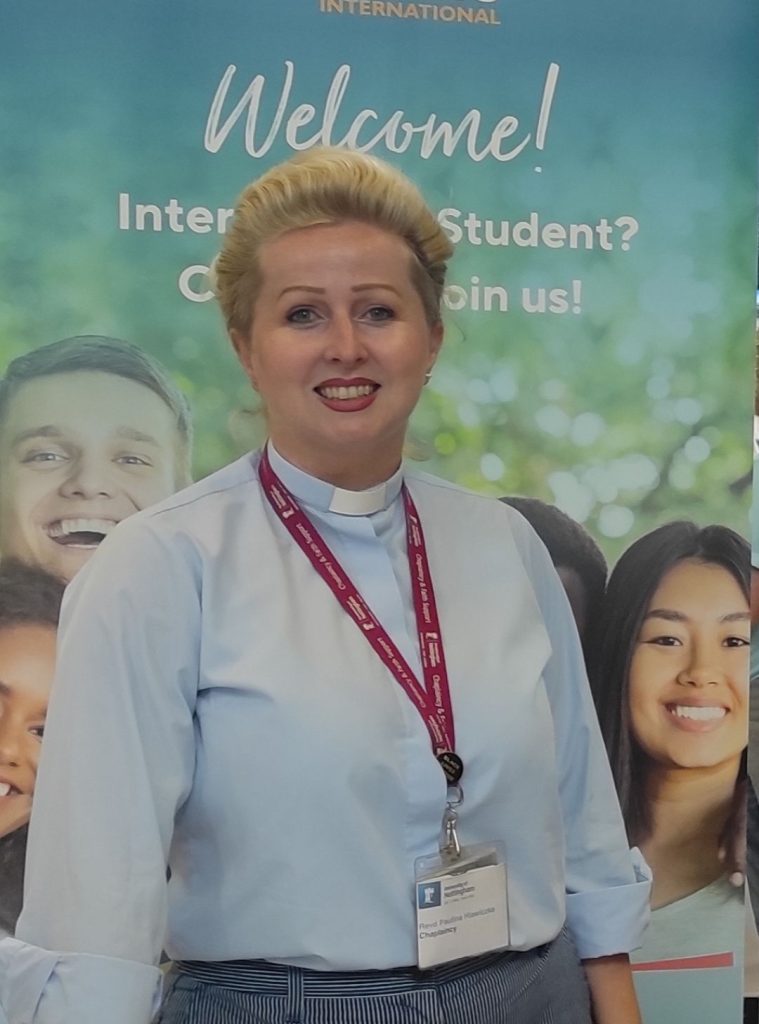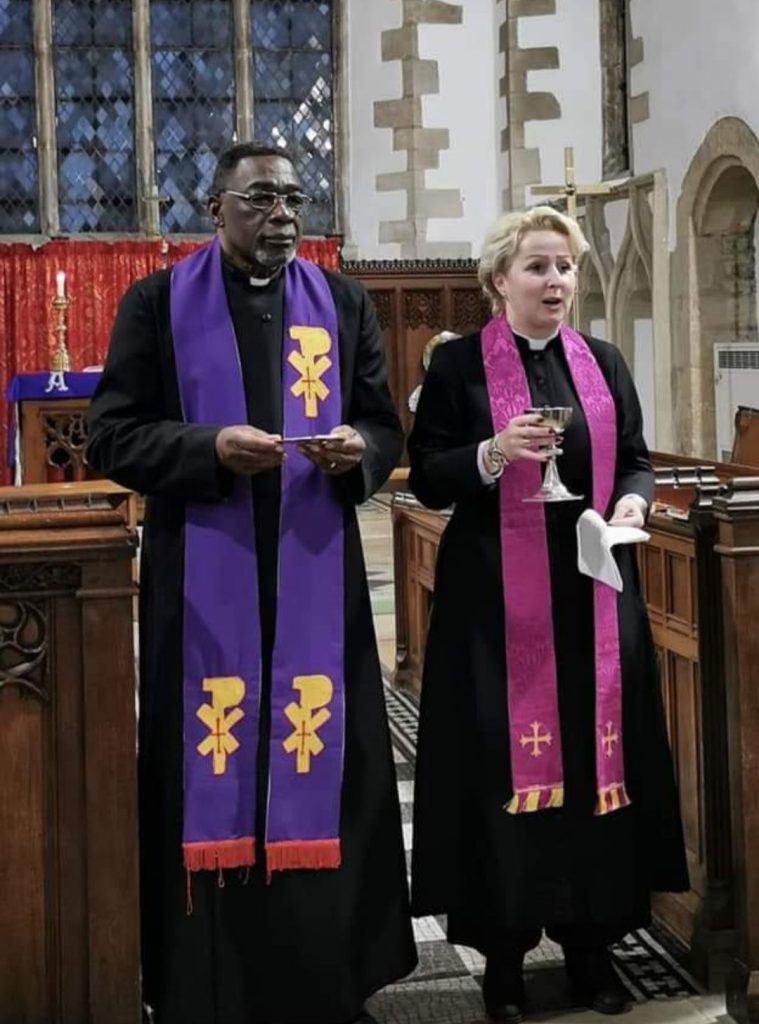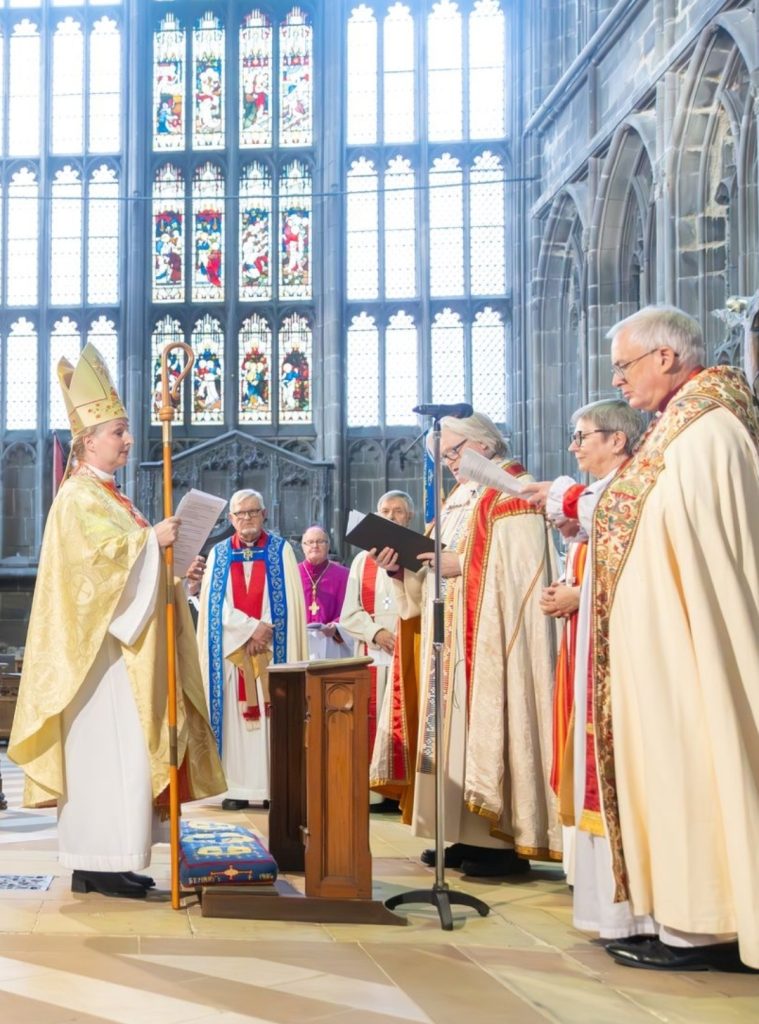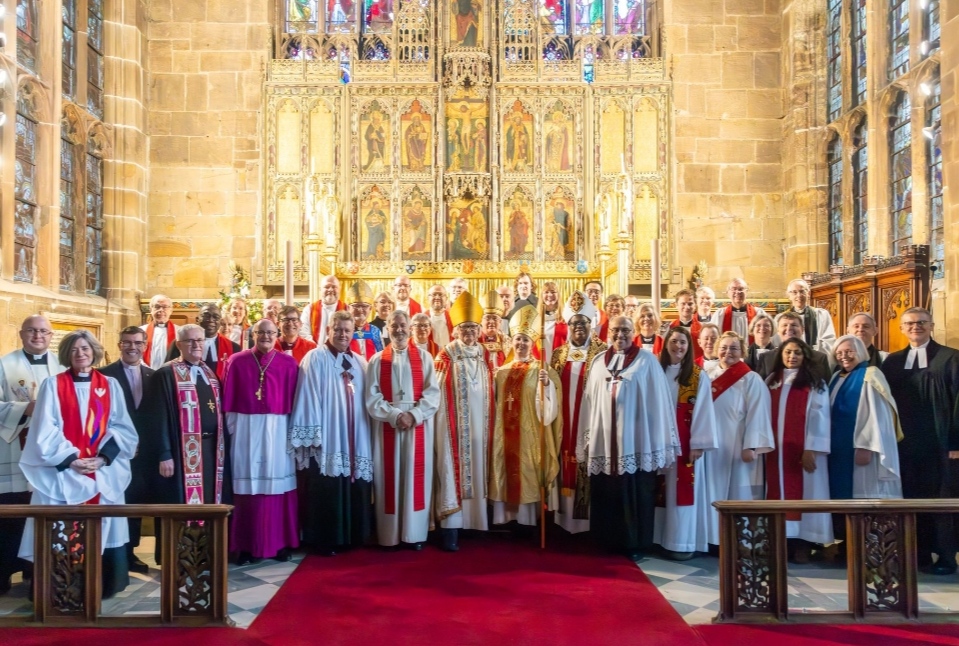As her term of office begins, Bishop Paulina (PHT) spoke to CTE’s Senior Communications Manager, Sarah Ball (SB)
SB: Congratulations on your role. How does it feel to be a President of Churches Together in England?
PHT: It’s very exciting! I am truly happy to have this opportunity, and I see it as a great door that has opened for me. I’m still in the early stages of getting to know everyone involved. However, I’m already very hopeful about what we can achieve together.
One of my goals is to foster more listening between different churches. Listening may seem simple, but it’s vital, especially when representing so many voices. Many of the churches have been working together for years, and I want to understand both their challenges and their progress. We’ve already had some fruitful discussions, and I’m optimistic about our collective work.
SB: How has your background influenced your church leadership?
PHT: Growing up in Poland, a predominantly Roman Catholic country, I was fortunate to be part of a peaceful, ecumenical environment. The region where I lived had a strong Lutheran presence, and although Roman Catholicism dominated, there was always collaboration between different Christian communities. We shared worship, singing, and other projects. This sense of ecumenism—of working together despite differences—has shaped my worldview and leadership style. I don’t see division as inevitable; I see opportunities for cooperation and understanding.
SB: I understand you have a surprising connection to Pope John Paul II.
PHT: Yes, it’s quite an incredible story. When I was a child, Pope John Paul II visited my hometown, and he came specifically to the church where I was baptized, which was on a hill outside the town since for a long time Lutherans were not allowed to build their sanctuaries in town centres. It was quite puzzling at the time because, despite being the head of the Roman Catholic Church, he didn’t visit any Catholic churches during his trip to the mountains. He only came to this Lutheran church, and I remember wondering why that was.
It wasn’t until much later, after his death, that we learned the hidden truth – Pope John Paul II had some Lutheran heritage as well. His grandmother came from the region where my family lived, and through some research, we discovered that we were actually related. This was a well-kept secret during his lifetime, likely because it would have been very controversial for someone with Lutheran roots to rise to such prominence in the Roman Catholic Church. Learning this after his death deepened my own sense of connection to the ecumenical movement.
SB: Can you tell us more about your journey into ministry?
PHT: My journey into ministry was anything but straightforward. In Poland, women were not allowed to be ordained in the Lutheran church until 2022. When I began my theological studies, there was immense pressure for women to marry pastors rather than pursue ministry themselves. Alongside theology, I was preparing myself for a very different path – to be an opera singer. So I knew when I felt a strong call from God that my purpose was to serve the Church directly, not just through marriage.
I was ordained in LCiGB n in 2014 by Rt Rev Dr Martin Lind from Sweden, who at that time was head of the LCiGB. He’s my spiritual leader. I learnt from him that the role of bishops is to open doors to others.
LCiGB had its first female Bishop in 2009. Bishop Jāna Jēruma-Grīnberga was the first female bishop in Britain. She also served as a President of Churches Together in England between 2010 and 2014.
I continued to be deeply involved in the campaign for women’s ordination in my home country, and in 2022, Poland finally ordained its first female Lutheran pastors. It was a truly historic moment, and I was honoured to witness the ordination of nine women in Warsaw. It was the culmination of our years of effort.



SB: Do you think female leaders still face challenges in the church today?
PHT: I do. Female leaders continue to face significant challenges, even in places where women’s ordination is accepted. In some communities, there is still strong resistance to women holding positions of authority, and these views can manifest in both subtle and overt forms of discrimination. This kind of resistance can make it difficult for women to fulfill their calling.
However, I believe strongly in the power of dialogue and friendship. Even when we disagree, it’s important to keep talking, to keep building relationships. The key is to demonstrate through our work that women are just as capable of serving God and leading the Church as men. I have seen how God’s call transcends human limitations, and I’m not afraid to stand up for what I believe. Ultimately, the work we do speaks for itself, and over time, I believe that hearts and minds can change.
SB: You’re part of an interchurch family—how does that influence your perspective?
PHT: Being part of an interchurch family has been a wonderful, eye-opening experience. My husband, Rev Arlington W Trotman, is a Methodist, and we met through racial justice and migration work. He is a former Commission Secretary of the Churches’ Commission for Racial Justice at Churches Together in Britain and Ireland.
We started our deeper conversations by discussing a theologian we both admire – Paul Tillich. My now husband has written a lot about him. Tillich was a German-American Christian existentialist philosopher and Lutheran theologian who was one of the most influential theologians of the twentieth century. He taught at German universities before immigrating to the United States in 1933, where he taught at Union Theological Seminary, Harvard University, and the University of Chicago.
My husband’s work in migration and refugee issues brought me new perspectives, especially coming from Poland, where issues like asylum and migration weren’t as prominent in my everyday life. He helped me understand the complexities of these issues in the UK, and this has influenced how I approach ecumenical work today.
Our marriage proves that God can bring people together across different faith traditions. We are living proof that unity is possible, even when there are differences in ethnic background and denomination.
SB: As well as being a CTE President and the head of the LCiGB you are also a chaplain at the University of Nottingham. What does that bring to your ministry?
PHT: It’s one of the most rewarding aspects of my ministry. Working with young people keeps me connected to the real issues they face and the challenges they encounter in today’s world. It’s inspiring to see their passion for justice, their desire to break down denominational barriers, and their commitment to making the world a better place.
One of the things I love most about working with students is that they challenge the status quo. They often ask why things have to be done a certain way, especially when it comes to denominations. They aren’t interested in divisions—they want unity. It’s refreshing and gives me hope for the future of the Church. Their questions and ideas push me to think differently, and I find their energy and vision incredibly valuable for my own growth and understanding as a leader.

SB: What do you see as the major challenges for English ecumenism today?
PHT: One of the biggest challenges for English ecumenism is the rise of deep conservatism and fundamentalism within some communities. This can make open dialogue difficult, as certain groups may be unwilling to engage with differing viewpoints. The fear of engaging with different perspectives can really stifle progress in bringing churches together. I’ve seen how this kind of thinking can divide people, and it’s something that we need to address with care and commitment. So far I understand that CTE is not responsible for promoting views, but same as my church, the Lutheran Church in Great Britain (international & inclusive), CTE is given the role of embracing all different views and facilitating a safe platform for us all to have a dialogue through the lenses of God’s love and forgiveness.
Another ongoing challenge is racism. Even though there have been many efforts and reports addressing racial justice, there’s a sense of fatigue around the topic in some circles. People feel like enough has been said or done, but the truth is that the work is far from over. We can’t allow ourselves to become complacent.
Watch Bishop Paulina speak on racial justice at the CTE Enabling Group for Autumn 2024.
The Church has a responsibility to continue fighting for racial justice, promoting peace, and caring for God’s creation. These aren’t just political issues; they’re spiritual ones that lie at the heart of what it means to be a follower of Christ.
Additionally, questions about the role of women in the church continue to be a challenge. Although many churches in the UK, like my own, have embraced female leadership, there are those where women are not fully accepted in roles to which they have been called by God. This is another area where we need ongoing dialogue and understanding. The Church must remain a space where these conversations can happen openly, and where different voices can be heard and valued.
SB: Who has inspired you from beyond your own Lutheran tradition?
PHT: One of my greatest inspirations is Professor Waclaw Hryniewicz, a Polish Roman Catholic theologian. He had a profound impact on my theological thinking, particularly with his work on apocatastasis, which is the idea of universal reconciliation—that salvation is ultimately for everyone. His writings offered such a hopeful and inclusive vision of God’s grace, and they really expanded my understanding of theology.
What I admired most about him was his commitment to ecumenism. He worked tirelessly to bring together people from different Christian traditions—Lutherans, Orthodox, and Catholics—especially in Poland, where the divisions can be quite pronounced. He was a peaceful, humble man who used language that brought people together, rather than driving them apart. Even in the most difficult theological debates, he always approached things with a calm and unifying spirit.
His influence is still very much alive in my work today. I’m currently writing about his theology for a Polish magazine, which speaks to how deeply his ideas have shaped me. He showed me that there is no single, fixed way of understanding or practising faith, and that openness to dialogue and difference is essential for growth, both personally and within the Church.
Bishop Paulina was nominated as a CTE President in June 2024.